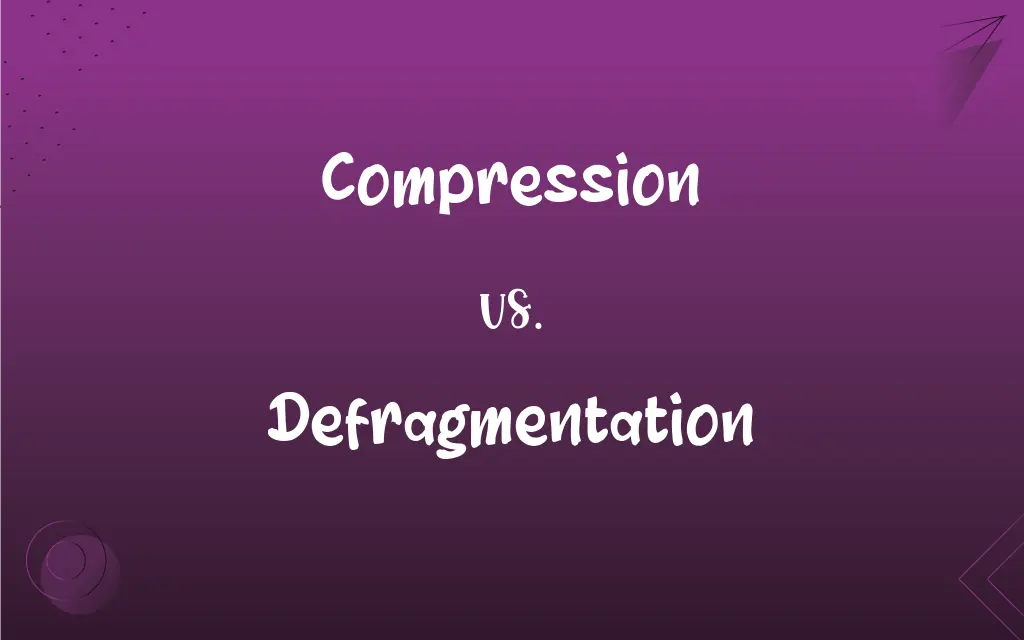Compression vs. Defragmentation: What's the Difference?
Edited by Harlon Moss || By Janet White || Updated on September 21, 2023
Compression reduces file size by encoding data efficiently, whereas defragmentation optimizes storage by reorganizing fragmented files.

Key Differences
Compression and defragmentation are both vital processes in computer science, aimed at optimizing resource usage but serving different purposes. Compression is the process of reducing the size of a file or data stream by encoding information in an optimized way. It’s crucial for saving storage space and reducing transmission time and bandwidth usage. On the other hand, defragmentation is the process of reorganizing the data on a disk so that the pieces of each file are stored in contiguous locations, optimizing read/write speeds and overall performance.
Compression comes in lossless and lossy types. Lossless compression retains the original data integrity upon decompression, ideal for text or spreadsheet files, while lossy compression loses some information, suitable for audio or images where perfect fidelity isn’t critical. Conversely, defragmentation doesn’t alter the data integrity but rearranges the storage of data to enhance disk efficiency and access speed, crucial for maintaining optimal system performance, especially in HDDs.
Compression primarily focuses on representing data in a more efficient, compact form, affecting the actual content of files or data streams. It’s a vital component in data transmission and storage management, especially in scenarios where resources are limited or expensive. Defragmentation, instead, focuses on the spatial organization of data on a storage device, ensuring that related data segments are positioned closely together, minimizing the disk head movement required to access files, thereby improving retrieval times.
In the application context, compression is extensively used in data transfers, file storage, and multimedia processing, allowing for efficient utilization of available resources and facilitating quicker exchanges of information. Defragmentation is predominantly a maintenance task for hard drives, helping in prolonging the life of the storage device and ensuring consistent performance by minimizing the time taken to read or write files.
In essence, while compression concentrates on minimizing the representation space of data by utilizing efficient encoding techniques, defragmentation is concerned with optimizing the physical storage of data to enhance access speeds and system performance.
ADVERTISEMENT
Comparison Chart
Purpose
Reduces file size by encoding data efficiently.
Optimizes storage by reorganizing fragmented files.
Impact on Data
Can alter data (lossy) or retain integrity (lossless).
Does not alter data but rearranges its storage.
Application
Data transmission, file storage, multimedia processing.
Disk maintenance, primarily on HDDs.
Frequency of Use
Regular, whenever data is stored or transmitted.
Periodic, as a maintenance task to optimize performance.
Benefit
Saves storage space, reduces transmission time.
Improves read/write speeds, optimizes storage.
ADVERTISEMENT
Compression and Defragmentation Definitions
Compression
Compression in medicine means applying pressure to stop bleeding or support a part of the body.
The compression bandage helped reduce the swelling.
Defragmentation
Defragmentation is used to rearrange files on a computer's disk so that they occupy contiguous locations.
Defragmentation of the computer’s hard drive improves its performance.
Compression
Compression in digital media refers to the process of reducing file size by eliminating redundant or unnecessary data.
Image compression is vital for optimizing website performance.
Defragmentation
Defragmentation is predominantly a maintenance task for hard drives.
Defragmentation is recommended primarily for systems using HDDs.
Compression
Compression can refer to the reduction in volume or pressure of a gas or liquid.
Compression of the air in the cylinder enables the car engine to function.
Defragmentation
Defragmentation is the process of reorganizing fragmented files on a disk to improve efficiency.
Regular defragmentation can extend the life of a hard drive.
Compression
Compression in computing means representing data in a format that requires less memory or storage space.
Data compression techniques are fundamental in cloud storage.
Defragmentation
Defragmentation optimizes the storage by consolidating fragmented files and free spaces.
Defragmentation is crucial for maintaining optimal system performance.
Compression
The act or process of compressing.
Defragmentation
Defragmentation in computing enhances the speed of data retrieval and access.
Running defragmentation regularly ensures quick access to files.
Compression
The state of being compressed.
Defragmentation
To reorganize (a storage device) to eliminate or reduce fragmentation.
Compression
The process by which the working substance in a heat engine, such as the vapor mixture in the cylinder of an internal-combustion engine, is compressed.
Defragmentation
(computing) The action of defragmenting, particularly with respect to a computer disk or drive.
Compression
The engine cycle during which this process occurs.
Compression
(Computers) The process by which data is compressed into a form that minimizes the space required to store or transmit it.
Compression
An increase in density; the act of compressing, or the state of being compressed; compaction.
Compression
(automotive) The cycle of an internal combustion engine during which the fuel and air mixture is compressed.
Compression
(computing) The process by which data is compressed.
Compression
(music) The electronic process by which any sound's gain is automatically controlled.
Compression
(astronomy) The deviation of a heavenly body from a spherical form.
Compression
The act of compressing, or state of being compressed.
Compression
Reduction of the space required for storage (of binary data) by an algorithm which converts the data to a smaller number of bits while preserving the information content. The act of compressing {3}.
Compression
An increase in the density of something
Compression
The process or result of becoming smaller or pressed together;
The contraction of a gas on cooling
Compression
Encoding information while reducing the bandwidth or bits required
Compression
Applying pressure
Compression
Compression is the process of reducing the size of a file or data stream.
Compression is essential for sending large files over the internet.
FAQs
Is compression always lossless?
No, compression can be lossless or lossy, depending on whether it retains or loses some information.
Is defragmentation necessary on SSDs?
Generally, defragmentation is not necessary and is not recommended on SSDs as it can reduce their lifespan.
Does compression affect file quality?
Lossy compression does affect file quality, while lossless compression retains the original quality.
Is compression used in streaming services?
Yes, streaming services use compression to reduce bandwidth usage and improve loading times.
Is compression ratio fixed?
No, the compression ratio varies depending on the algorithm and the data being compressed.
Does defragmentation delete data?
No, defragmentation does not delete data; it reorganizes it on the storage device.
How often should defragmentation be done?
For HDDs, regular defragmentation is beneficial, but the frequency depends on disk usage.
Does defragmentation affect system performance?
Yes, defragmentation can improve system performance by optimizing file access on HDDs.
Can compression be reversed?
Lossless compression can be fully reversed, while lossy compression cannot be perfectly reversed.
Can compression be applied to any file type?
Yes, virtually any file type can be compressed, but the effectiveness of compression varies.
Can compression cause data loss?
Lossy compression results in data loss, but lossless compression retains all original data.
Can defragmentation be scheduled?
Yes, many operating systems allow users to schedule defragmentation at regular intervals.
Is defragmentation a one-time process?
No, defragmentation is a recurring process, especially important for systems with high disk usage.
Does defragmentation require user intervention?
While some systems automate defragmentation, users can manually initiate the process.
Is compressed data secure?
Compression itself doesn’t ensure security; encrypted compression is needed for secure transmission.
About Author
Written by
Janet WhiteJanet White has been an esteemed writer and blogger for Difference Wiki. Holding a Master's degree in Science and Medical Journalism from the prestigious Boston University, she has consistently demonstrated her expertise and passion for her field. When she's not immersed in her work, Janet relishes her time exercising, delving into a good book, and cherishing moments with friends and family.
Edited by
Harlon MossHarlon is a seasoned quality moderator and accomplished content writer for Difference Wiki. An alumnus of the prestigious University of California, he earned his degree in Computer Science. Leveraging his academic background, Harlon brings a meticulous and informed perspective to his work, ensuring content accuracy and excellence.































































